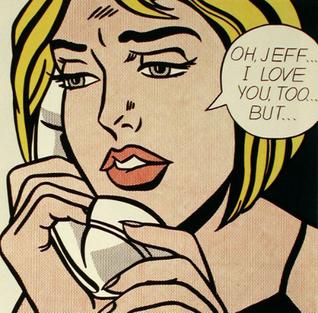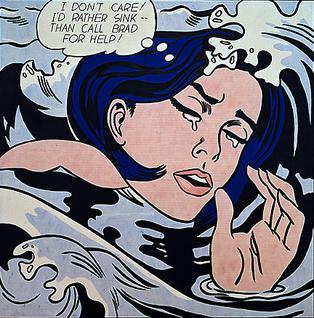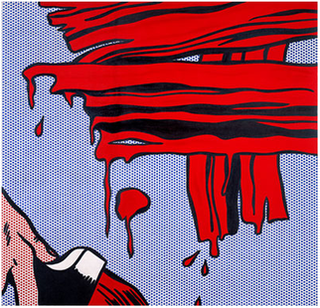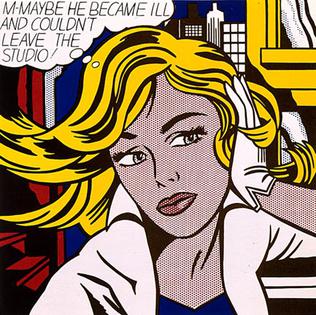
Roy Fox Lichtenstein was an American pop artist. During the 1960s, along with Andy Warhol, Jasper Johns, and James Rosenquist, he became a leading figure in the new art movement. His work defined the premise of pop art through parody. Inspired by the comic strip, Lichtenstein produced precise compositions that documented while they parodied, often in a tongue-in-cheek manner. His work was influenced by popular advertising and the comic book style. His artwork was considered to be "disruptive". He described pop art as "not 'American' painting but actually industrial painting". His paintings were exhibited at the Leo Castelli Gallery in New York City.

The Museum of Contemporary Art Tokyo is a contemporary art museum in Koto, Tokyo, Japan. The museum is located in Kiba Park. It was opened in 1995.

Little Big Painting is a 1965 oil and Magna on canvas pop art painting by Roy Lichtenstein. It is part of the Brushstrokes series of artworks that include several paintings and sculptures. It is located at the Whitney Museum of American Art in New York City. As with all of his Brushstrokes works, it is in part a satirical response to the gestural painting of abstract expressionism.

Look Mickey is a 1961 oil on canvas painting by Roy Lichtenstein. Widely regarded as the bridge between his abstract expressionism and pop art works, it is notable for its ironic humor and aesthetic value as well as being the first example of the artist's employment of Ben-Day dots, speech balloons and comic imagery as a source for a painting. The painting was bequeathed to the Washington, D.C., National Gallery of Art upon Lichtenstein's death.

Girl in Mirror is a 1964 porcelain-enamel-on-steel pop art painting by Roy Lichtenstein that is considered to exist in between eight and ten editions. One edition was part of a $14 million 2012 lawsuit regarding a 2009 sale, while another sold in 2010 for $4.9 million. Although it uses Ben-Day dots like many other Lichtenstein works, it was inspired by the New York City Subway rather than directly from a panel of a romance comics work.

Oh, Jeff...I Love You, Too...But... is a 1964 oil and magna on canvas painting by Roy Lichtenstein. Like many of Lichtenstein's works its title comes from the speech balloon in the painting.

Big Painting No. 6 is a 1965 oil and Magna on canvas painting by Roy Lichtenstein. Measuring 235 cm × 330 cm, it is part of the Brushstrokes series of artworks that includes several paintings and sculptures whose subject is the actions made with a house-painter's brush. It set a record auction price for a painting by a living American artist when it sold for $75,000 in 1970. The painting is in the Kunstsammlung Nordrhein-Westfalen collection.

Drowning Girl is a 1963 American painting in oil and synthetic polymer paint on canvas by Roy Lichtenstein, based on original art by Tony Abruzzo. The painting is considered among Lichtenstein's most significant works, perhaps on a par with his acclaimed 1963 diptych Whaam!. One of the most representative paintings of the pop art movement, Drowning Girl was acquired by the Museum of Modern Art in 1971.

I Know...Brad is a 1964 pop art painting by Roy Lichtenstein that uses his classic Ben-Day dots and a speech balloon. The work is located at the Ludwig Forum für Internationale Kunst in Aachen. It is an example of how Lichtenstein used his artistry to make significant changes to the original comics sources.

Brushstrokes series is the name for a series of paintings produced in 1965-1966 by Roy Lichtenstein. It also refers to derivative sculptural representations of these paintings that were first made in the 1980s. In the series, the theme is art as a subject, but rather than reproduce masterpieces as he had starting in 1962, Lichtenstein depicted the gestural expressions of the painting brushstroke itself. The works in this series are linked to those produced by artists who use the gestural painting style of abstract expressionism made famous by Jackson Pollock, but differ from them due to their mechanically produced appearance. The series is considered a satire or parody of gestural painting by both Lichtenstein and his critics. After 1966, Lichtenstein incorporated this series into later motifs and themes of his work.

Engagement Ring is a 1961 pop art painting by Roy Lichtenstein. The work is based on the Winnie Winkle series, but Lichtenstein changed both the graphical description and the narrative accompaniment that he presents in a speech balloon. As with most of his early romance comics works, this consisted of "a boy and a girl connected by romantic dialogue and action".

M-Maybe is a 1965 pop art painting by Roy Lichtenstein. It is one of his romance comics-based works.

Sleeping Girl is a 1964 oil and Magna on canvas pop art painting by Roy Lichtenstein. It held the record for the highest auction price for a Lichtenstein painting from May 2012 until May 2013.

Ohhh...Alright... is a 1964 pop art painting by Roy Lichtenstein. It formerly held the record for highest auction price for a Lichtenstein painting.

In the Car is a 1963 pop art painting by Roy Lichtenstein. The smaller, older of the two versions of this painting formerly held the record for highest auction price for a Lichtenstein painting. The larger version has been in the collection of the Scottish National Gallery of Modern Art in Edinburgh since 1980.

Happy Tears is a 1964 pop art painting by Roy Lichtenstein. It formerly held the record for highest auction price for a Lichtenstein painting.

Woman with Flowered Hat is a 1963 pop art painting with Magna on canvas by Roy Lichtenstein. The work is based on a Pablo Picasso portrait of Dora Maar. In May 2013, it sold for a record price for a Lichtenstein work.

Crying Girl is the name of two different works by Roy Lichtenstein: a 1963 offset lithograph on lightweight, off-white wove paper and a 1964 porcelain enamel on steel.

Hopeless is a 1963 painting with oil paint and acrylic paint on canvas by Roy Lichtenstein. The painting is in the collection of the Kunstmuseum Basel.

Arthur F. Peddy was an American comic book and advertising artist best known for co-creating Quality Comics' superhero character Phantom Lady and Atlas Comics' jungle girl character Jann of the Jungle. He also was known for a stint as penciler of the superhero team the Justice Society of America for what later became DC Comics.
This page is based on this
Wikipedia article Text is available under the
CC BY-SA 4.0 license; additional terms may apply.
Images, videos and audio are available under their respective licenses.



















